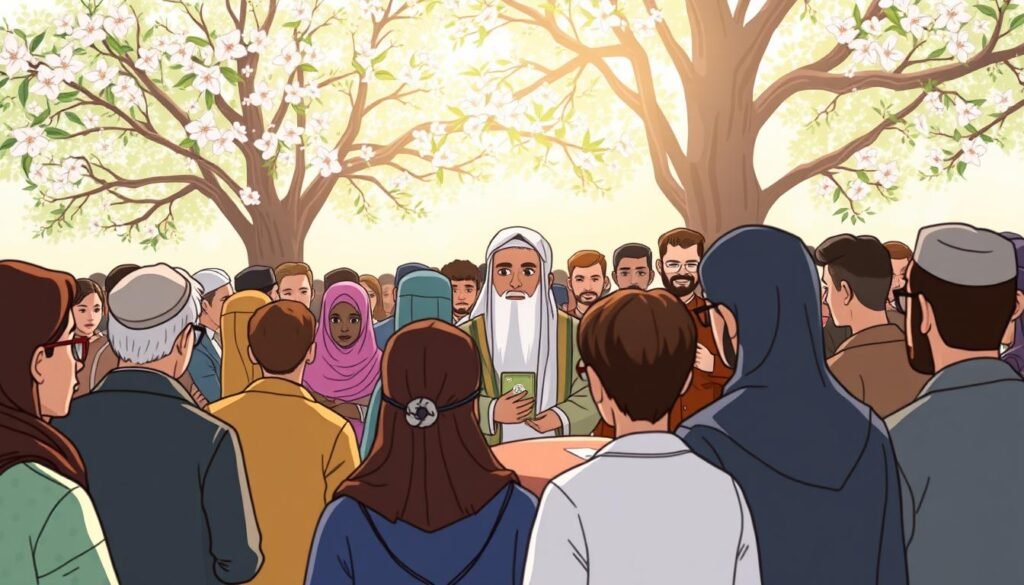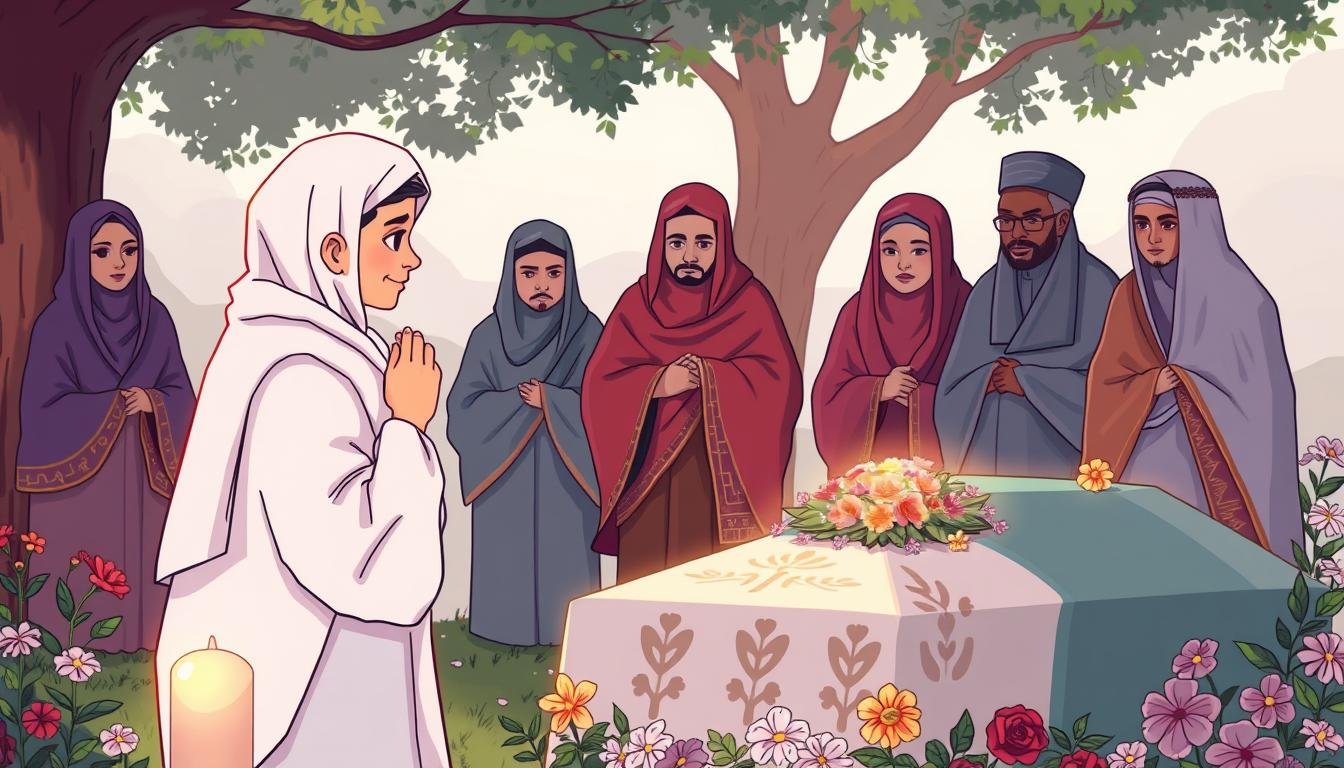Have you ever thought about if a Muslim can go to a non-Muslim funeral? This question is important, as it involves family and friends. In our world, where people from different beliefs live together, it’s key to understand this from an Islamic view.
For a long time, people have had different opinions on this. Some say Muslims shouldn’t go to non-Muslim funerals because of their beliefs. Others think it’s okay, as long as we treat our non-Muslim relatives with kindness. We will look at both sides, focusing on respecting cultures and following Islamic teachings.
Understanding Funeral Etiquette in Islam
To understand Islamic funeral customs, we must look at the culture around death and mourning. Muslims see death as a change, not the end. This makes funeral etiquette very important.
A Muslim funeral happens quickly, usually in 1-3 days. This shows respect and urgency for the deceased.
The body is washed by family or trusted community members. This act shows care and purity. Then, the body is wrapped in a simple white cloth. This shows modesty and the shortness of life.
The funeral prayer, or Salat al-Janazah, is a community event. It brings together family, friends, and the wider Muslim community. This shows support for the family and prayers for the deceased.
Funeral customs can differ in different communities. In some places, women may not attend burial ceremonies. After the burial, it’s common to offer condolences with hugs and words about the deceased’s life.
Graves are kept simple in Islamic customs. No flowers or candles are used. This shows humility. Places like Leicester have facilities for the Muslim community, including quick body releases and prayer spaces.
The Importance of Funeral Traditions in Different Cultures
Learning about funeral traditions in different cultures helps us understand how people grieve around the world. Each culture has its own way of mourning, showing its beliefs and values. For example, Jewish tradition calls for a quick burial, usually within 24 hours after death.
Muslims also value quick burials, often in the mosque courtyard with male community members present. This shows how urgent burial is in these cultures.
Hindu funerals often include cremation, done quickly, followed by rituals to free the soul. Sikh communities mourn through communal meals called Langar, bringing people together. This shows how mourning can be different across cultures.
African American “Homegoing” services are full of joy, unlike some other cultures. The Mexican Day of the Dead is a celebration of life, with colorful altars and family gatherings. Chinese funerals, influenced by Confucianism, Taoism, and Buddhism, have elaborate rituals to honor ancestors.
Exploring these traditions helps us respect each other’s cultures. Each one shows how grief is shared but expressed differently.
Can A Muslim Go To A Non Muslim Funeral?
Many scholars have different views on if a Muslim can go to a non-Muslim funeral. Islamic teachings stress following religious rules and respecting cultural norms. The Islamic ruling on funerals usually says Muslims should not go to non-Muslim funerals. This is because of worries about joining in non-Islamic rituals and ceremonies.
The Quran says, “It is not for the Prophet and those who believe to pray for the forgiveness of idolaters” (Quran 9:113). This verse shows the challenge of staying true to Islam at non-Muslim funerals. Yet, some believe it’s okay to go, mainly for family reasons.
Some scholars say it’s okay to join the funeral procession or offer condolences. But, you should not take part in non-Islamic rituals. Imam al-Nawawi, for example, says it’s fine to go to a non-Muslim relative’s funeral. The key is to balance showing compassion and following Islamic rules.

Even though Muslim attendance at funerals is tricky because of religious rules, it shows the importance of family and kindness across faiths. Respecting the beliefs of the deceased, even in times of sadness, highlights the complexity of interfaith relationships today.
Religious Considerations for Attending Non-Muslim Funerals
Going to funerals mixes faith, duty, and culture. Islamic teachings offer different views on attending non-Muslim funerals. They help Muslims balance religious duties and family ties.
Islamic Views on Participation in Non-Muslim Rituals
Many scholars advise caution at non-Muslim funerals. They say it might go against Islamic beliefs, like if it includes worship of more than one god. Some say no to joining in, but others see it as okay if it doesn’t hurt your faith.
Sunni Islam says it’s wrong to ask forgiveness for a non-Muslim in certain rituals. But, wishing for a non-Muslim’s well-being is okay. This shows respect for people beyond their faith. You can learn more about this at this resource.
Distinction Between Family Obligations and Religious Beliefs
Islam values family ties a lot. This might make Muslims want to go to funerals of non-Muslim relatives. Scholars say it shows respect and support for the family, which is kind and compassionate.
Even with doubts, people are urged to think deeply about it. It’s a tough choice between family and faith. This leads to important talks in the community about respecting family and faith.
The Prophet Muhammad’s Guidance on Funerals
The life and teachings of Prophet Muhammad offer deep insights into funeral customs in Islam. Islamic funeral guidance stresses respect, dignity, and proper conduct during mourning. The Prophet Muhammad’s teachings show the value of being compassionate, even to non-Muslims.
When death or mourning happens, Muslims are advised to be balanced. They should reflect on Hadith on funerals that teach respectful behavior.
Funeral customs include burying the dead as soon as possible, usually within 24 hours. Mourning periods have changed, with some communities now mourning for less than 40 days. The Prophet’s kindness to those of different faiths shows how Muslims can respect others while staying true to their beliefs.
In Islamic culture, funerals are community events to support the grieving. These gatherings allow Muslims to show their sorrow in accepted ways. Loud wailing is not allowed, but weeping is okay.
The Prophet Muhammad taught that showing sorrow is important. This shows the community’s values and moral framework when dealing with loss. It encourages kindness and support.
Also, preparing the body for burial is very important. The Prophet Muhammad gave rules for washing the deceased, which is seen as necessary. This shows the respect given to the dead.
Through these teachings, believers learn how to act during funerals. They honor the deceased and stay true to their faith. The Prophet Muhammad’s teachings guide them through these sensitive times, bringing hope and respect.
Must-Know Islamic Teachings Regarding Relationships with Non-Muslims
Islamic teachings on relationships with non-Muslims are key in diverse societies. The Qur’an guides us on how to keep our faith while being friends with others. For example, Surah Aal Imran: 28 teaches us to be careful but kind.
This balance helps us build strong social ties. It teaches us to be just and kind, no matter who we’re with.
The idea of Mudarat lets us have good friendships. But Mawadda is not allowed if it goes against our faith. We must treat everyone with respect, even if they don’t believe the same as us.
Surah al-Mumtahina: 8 tells us to be fair to those who haven’t hurt us.
The Prophet Muhammad showed us how to be peaceful with others. His patience and the treaty of Hudaybiyya teach us to try to get along. Imam Abu Bakr al-Jassas said being kind can open doors to share our faith.
Following these examples helps us live together in peace. We respect each other’s beliefs but stay true to our own.
Also, scholars talk about asking forgiveness for non-Muslims. While we can’t pray for them after they die, wishing them well is okay. This shows we care about everyone, no matter their faith.
The Role of Kindness in Interfaith Relations
Kindness is key in building bridges between different faiths. It connects communities with diverse beliefs. In Islam, kindness is more than a personal trait. It’s a core principle for all interactions, including with those from other faiths.
Examples from Islamic History
Islamic history is full of examples of kindness towards non-Muslims. The Prophet Muhammad’s life shows us the power of compassion. He stood up for everyone’s rights, no matter their faith.
He taught us to be generous to visitors. This helps us live peacefully with people from different backgrounds.
Importance of Maintaining Family Ties
Keeping Muslim family ties is very important. Families often have members from different faiths. Showing respect and kindness can help us understand each other better.
It makes our family bonds stronger. We can celebrate our shared humanity and respect our different beliefs.
Assessing the Context: When is Attendance Acceptable?
It’s key to know when it’s okay for a Muslim to go to a non-Muslim funeral. Some situations make it okay, like family ties or community bonds. Islamic scholars have different views on these matters. They look at religious teachings and the challenges of today’s world.
Circumstances That May Allow Attendance
There are times when going to a funeral is okay. For example, if a family member dies, going to the service can honor that bond. It also helps comfort those who are sad. Keeping family ties strong is often more important than worries about religious rules.
Support from the community during hard times can also help. It shows that people care for each other, even if they believe differently.
Recommendations from Islamic Scholars
Islamic scholars give different advice based on the situation. Some say it’s okay to go to a non-Muslim funeral to keep family or community ties strong. They suggest being respectful and kind, focusing on the reason for going, not the funeral itself.
They stress the value of staying connected during tough times. This is very important in places where people of different faiths live together.
Respecting the Beliefs of the Deceased
When we meet at funerals, we must be very aware of respect in funerals. Each faith has its own special values. These values include the beliefs of the deceased and their families.
Going to a funeral of someone who is not Muslim can be tricky. It’s about showing kindness without giving up our faith. This respect shows the human side that Islam values.
By respecting traditions, we show the Islamic value of dignity for everyone. Being there shows we care, even if we don’t share the same beliefs. It helps build bridges between different groups.

In times of sadness, we focus on honoring the person who has passed away. We show respect, knowing that every faith has its own way of remembering lives. These moments can help us grow closer and start meaningful conversations, all while staying true to our beliefs.
Conclusion: Navigating Interfaith Situations with Respect
When we talk about interfaith understanding, we see the need for dialogue and respect. Our communities are getting more diverse. We must honor Islamic beliefs and also see our shared humanity with others.
Death is something we all face, and it brings us together. By being respectful at funerals, we show compassion. This shows that kindness can bridge different beliefs.
Engaging with empathy can make our experiences richer. When we support those who are grieving, we show we are all connected. Let’s keep working towards understanding and supporting each other, no matter our faith.
FAQ
Can Muslims attend non-Muslim funerals?
What is the significance of funeral etiquette in Islam?
How do different cultures approach funerals?
What Islamic teachings address attending non-Muslim funerals?
How did Prophet Muhammad navigate interfaith funerals?
What do Islamic teachings say about relationships with non-Muslims?
Why is kindness essential in interfaith relations?
Under what circumstances might attending a non-Muslim funeral be acceptable?
How can Muslims show respect for the beliefs of the deceased?

Embracing Faith, One Insight at a Time!
The teachings of the Quran have always guided my path. With a deep passion for Islamic knowledge, I strive to blend the wisdom of tradition with the relevance of today, making the timeless messages of Islam accessible and meaningful for everyone.
Muslim Culture Hub is my platform to share historical insights and thought-provoking articles, exploring both well-known and lesser-discussed aspects of Islamic culture and beliefs. My mission is to create an inclusive online space where everyone can learn, strengthen their faith, and connect with the profound message of Islam.
Join the journey!
May peace be upon you.








